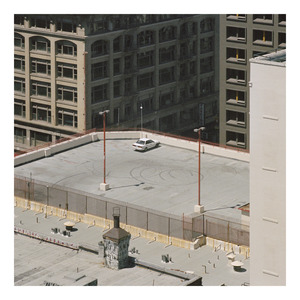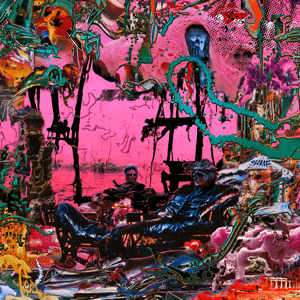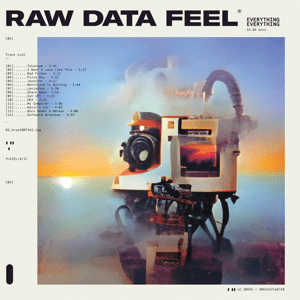I never got round to talking about all of Kendrick's records after TBAP an untitled, unmastered back when I started the blog, but in short DAMN. was a record for me that while I appreciated Kendrick's more introspective lyrics and the overall concept of the album, I've never fully clicked with the more synthetic instrumentation and beats. Nor do I think Kendrick's skillset as a rapper and vocalist really match the modern R&B aesthetics on some of the songs, leaving some of them to feel kind of like duds to be honest. So when The Heart Pt.5 came out as the non-album teaser for this new era of Kendrick and returned to a TBAP-esque soul instrumental I was really excited. The track is phenomenal and came across as very much a deliberate reaction to DAMN. both sonically and lyrically. DAMN. saw Kendrick in a very dark place feeling like the weight of expectations were on him to be some kind of saviour for black people following how critically acclaimed (and politically charged) TPAB was. The Heart Pt.5 sees him in a much more self assured place in regards to his relationship with his fans and Black America in general.
This theme is carried through into Mr. Morale & The Big Steppers and is very much the core concept of the record, how Kendrick feels put on a pedestal as a black savoir figure and how that impacts all aspects of his life - and ultimately his journey of rejection of that expectation alongside healing from his past traumas and demons. The record is an 18 track double record, the first half being the Big Steppers side which revolves around Kendrick's worst impulses and coping mechanisms regarding his fame and weight of expectations, but also his family and societal trauma growing up. The second half, the Mr. Morale side, is essentially the resulting therapy and healing that Kendrick goes through so he can finally feel at peace with himself and his family.
Musically, the record kind of follows on from TPAB in that there are some more jazzy and soul based instrumentals, but also follows on from DAMN. with a fair few synthetic modern hip-hop beats. But then in equal measure there is a good handful really out there experimental hip-hop moments that the closest thing I could compare them to is the more unconventional fusions of jazz and electronic beats on untiled, unmastered. The opening cut, United In Greif, is a great example of this. After opening with a barrage of bars from Kendrick, the track settles into its main passage - a combination of emotive jazzy piano chords, a skittering, glitchy breakbeat and synthetic bleeps and bloops. It genuinely sounds like a Radiohead beat and not really anything like Kendrick has rapped over before. The lyrics of the track delve deep into Kendrick's coping mechanisms to deal with grief and pain - primarily his shopping addiction and his desire for unnecessary status symbols (super cars and watches etc).
The first chunk of the Big Steppers side flows on from United In Greif in the themes and approach of the tracks, being very raw and direct about the uncomfortable sides of Kendrick's personality. N95 follows on from the opening track with something a lot more conventional and probably the closest thing a banger like HUMBLE. the record gets. While at points it comes off a little defensive, the track goes in on online mob mentality and victim culture that perpetuates hurt and division. I like it, but I feel it could've had another pass at the lyrics as Kendrick does conflate these ideas with 'cancel culture' at large at points. There is a difference between people looking for someone to blame for their own issues and holding people in positions of power accountable for damage they have caused. It's just a bit of an odd take for Kendrick to make considering how much of his music revolves around his own personal accountability and his determination to hold others to it too. Which is exactly what he does on the following track, Worldwide Steppers. The song is built around a really grimy and nocturnal pulsating beat which fits it's topic perfectly. Kendrick opens up about his experiences having sex with white women, and how it gave him a sense of power and revenge for the racism him and his forbearers have faced. This first chunk of the record cumulates in Father Time, one of the real standouts from the album. The track tackles Kendrick's relationship with his father and how his upbringing has given him a lot of negative attitudes and coping mechanisms (alongside a few positive ones). The track is loose and jazzy, and features a beautiful feature from Sampha on the hook. It's a really mature and forward-facing song, and one of the best examples of what the album is trying to be.
Unfortunately, the back end of the Big Steppers side is where the album begins to derail for a while, starting with the interlude Rich. The track is a spoken word piece, delivered by Kodak Black. Kodak is a rapper who was been charged with rape back in 2016, and on first glance you might think that Kendrick has chosen to include him on the record as some kind of representation of there 'being good and bad in all of us', but looking into Kodaks life, he has not gone through any attempt at redemption and continues to be involved in violent crime in the years since. Furthermore, the interlude steers clear of any reference to any of this, and essentially is just a pity-party about growing up in poverty and that's why the way he is. Kodak shows up in little snippets across the album and has a feature on Silent Hill, so this is clearly an intentional move from Kendrick, but not one that holds up to any scrutiny. Prominently including a controversial rapper who has not taken any accountability for their actions doesn't fit well on a record all about healing and self-accountability. The following song, Rich Spirit is fairly weak and uneventful, being a fairly run of the mill contemporary R&B song similar to some of the stuff on DAMN. The beat is pretty bland and Kendrick's lyrics are some of the least insightful on the album.
This is then followed by another 'controversial' track, We Cry Together. The song is essentially an argument between lovers put to music, and on a technical level it is brilliant. The back and forth flows from Kendrick and Taylour Paige sound amazing as does the dissonant, free jazz instrumental. Unfortunately the intentions of the track are muddled and not entirely obvious. On first glance, the track is a back and forth between the two characters where they take turns remarking on each others toxic behaviours, but on closer inspection the track is very one sided. Taylour masterfully tares down Kendrick's infidelity and insecure ego, but his comebacks just boil down to "Girls are bitchy" after you think about them for more than a second. I think that is the point he is going for, but it's not obvious, and considering some of the other thematic blunders on the album it wouldn't be a surprise if Kendrick's bars on this track are whole-heartedly earnest. The track also ends with a complete diffusing of the situation, where the two characters make up and start getting intimate, which again undermines whatever message the song is supposed to have. Lastly, Kendrick has made a good handful of 'arty' dramatic songs like this before (most notably u on TPAB), but I feel like this is the only one that I could never play out loud over a speaker, because it is literally an argument and there is a certain degree of embarrassment I would feel if someone overheard me listening to it.
Purple Hearts closes out the Big Steppers side and is fine. Summer Walker sounds quite nice over the glitzy R&B beat, although Kendrick is certainly the least interesting part of the song. The Mr. Morale side opens up with equal ambivalence for me. Count Me Out is a perfectly serviceable trap banger that lays out the second half of the record well, but it doesn't excite me. Crown is a dreary and fairly repetitive song that takes the common 'heavy is the head that wears the crown' motif and does nothing interesting with it. Silent Hill rounds out this trio of un-remarkability with another 'eh' trap song that doesn't do it for me. Here's where Kodak Black shows up for the last time and even ignoring the context of his appearance on the album, he adds nothing to the song. It does feature some pretty funny "Huh!" adlibs from Kendrick though that I can't help but smirk at - he sounds so stupid.
Thankfully the record picks up again in the second half of the Mr. Morale side. Savior is really the turning point, where Kendrick stops worrying about the opinions of others and you can hear the uplift in both the instrumental and the vocals. The hazy synths ascend up the chord progression and there is actually a catchy hook on the song for the first time since Father Time way back in the Big Steppers side. "Are you happy for me?" Kendrick's cousin, Baby Keem, beams during the chorus.
This launches into Auntie Diaries, one of the most personal songs on the record. The track tells the story of Kendrick's trans uncle and Kendrick's journey towards understanding and acceptance, and then later moves onto how one of Kendrick's cousins came out as trans. The storytelling on the track is excellent, with Kendrick's bars laced over a jazzy meandering beat. Similarly to Savior, the back end of the song builds and builds to a crescendo that feels like some sort of heavenly ascension as Kendrick finally comes to peace with the idea that his family members identify this way. Again, this track is one of the ones that has been tagged as 'controversial' due to Kendrick's use of the f-slur and deadnaming. I personally don't really see how these arguments hold much water, as the words are used to support the story and themes that despite Kendrick's initial belief that because he never said the words with malicious intent, they do indeed cause damage and he now sees that. However, I understand that I have no jurisdiction on what others consider offensive. The main fault I have with the track is actually the very last line, where Kendrick relates his previous use of the f-slur to an incident where he invited a white person on stage to sing along with him and they said the n-word and he shut them down and sent them back to the crowd. My problem is that Kendrick isn't actually very clear on what he means by this, is it that he now sees that he can't say the f-slur? Or that he's not going to pick up on white people singing the n-words in his songs when there's no malicious intent? The line seems pretty superfluous to the rest of the song and feels like it was only added in for some shock value to end the song on.
Mr. Morale takes the progressive outlook that has been building over the past couple of tracks and supercharges it into a confident and self-assured trap banger. Kendrick takes the healing he's been embracing and reflects on the trauma his family members and other black celebrities have experienced and whether they have managed to move on, or whether it is something that still haunts them. The beat is driving and the vocal contributions on the bridge by Tanna Leone sound cool as hell. This uplifting feeling is short lived, as the following track is the longest, deepest and darkest moment on the record, but incredibly necessary for the narrative of the album and for Kendrick's journey into healing outside of it - and honestly its the best out of the 18 tracks here.
That song is the 7 minute Mother I Sober, in which Kendrick dives deep into his own childhood and familial trauma with a level of specificity that is truly heart wrenching. The instrumental centres around a moody piano riff, and the mix remains relatively empty for the entire runtime - elevating the potency of every bar on the song. Kendrick details the history of sexual and physical violence within his family and the trauma it had caused within his mother and himself. He then elaborates on how his mother projected her experiences onto him, continually asking him if his cousin ever touched him, and refusing to believe Kendrick when he told her "no". He then ties it back to his coping mechanisms - the shopping and sex addictions - from the start of the album, allowing him to come full circle and truly heal and feel at piece. The structure of the song beautifully tells the story, the first verse detailing the abuse he witnessed as a child, followed by the second tackling the false accusations from Kendrick's mother, before the third reveals the reasons she felt that way and Kendrick can finally understand and let go. Each verse is punctuated by the harrowing vocals by Portishead's Beth Gibbons on the hook, and she is such a perfect fit for the song and by miles the best feature on the album.
Mirror closes the album out well with the repeated hook "I choose me, I'm Sorry". It perfectly encapsulates the journey and narrative of the album. However, following on from Mother I Sober, it feels a little lightweight in comparison. I still like the song, but it doesn't excite me like the past couple of songs before it.
Mr. Morale & The Big Steppers is such a mammoth album in content and theme (and 'controversy') that it's hard to have one coherent opinion on it. On one side, its bloated and messy, yet there's a whole albums worth of really great songs in it. It makes a good handful of thematic blunders, but when it's on point, its really on point. On the whole I certainly like it a lot more than DAMN. and I'll still put it on from time to time, so I'm definitely more on the positive side of things. However, mileage will definitely vary from person to person.
Top Tracks: United In Grief, N95, Worldwide Steppers, Father Time, Savior, Auntie Diaries, Mr. Morale, Mother I Sober
7/10











.png)


